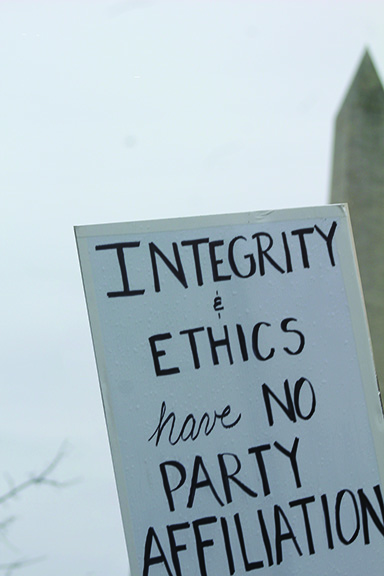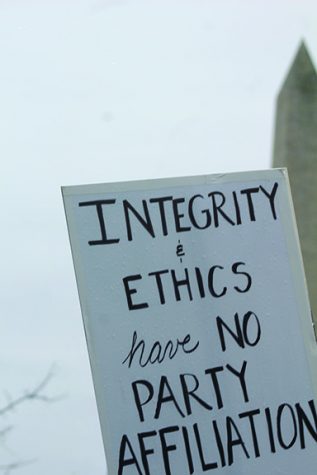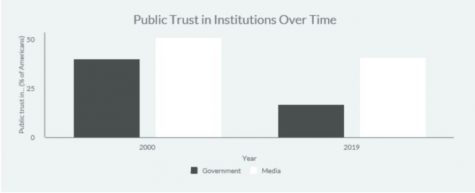Media Accountability: Not as Straightforward as we Might Think

The photo states “Integrity & Ethics have no party.”

This past December, NBC’s Meet the Press anchor Chuck Todd addressed an audience comprising thousands of high school journalists across the country at the National High School Journalism Convention in Washington D.C., speaking passionately and directly about the state of journalism and free press in America. He talked about his personal experiences in journalism, as well as the threats journalism faced in the current political scene. When Todd took questions from the audience, I asked him, “Which do you believe is more fundamental to democracy, the relationship between the people and the press or the people and their government?”
Todd believed that the people and the press shouldn’t be viewed as separate entities, but rather that “the people” should be viewed as inclusive of the press. I would take a different approach.
There is an inherent relationship between all people and their government: we call it a “social contract”, as coined by Jean-Jacques Rousseau. People and their governments possess a relationship founded on the consent of the governed, but that same relationship is not inherent between the people and the press nor the government and the press. The press is a medium through which the government communicates policy and through which the government is held accountable. Across the world, nations are without access to free press, which is why the press cannot be viewed as a part of the people. While the press can be a tool for the people to hold the government accountable, it can also be a tool for the government to manipulate the people. In this manner, the press becomes a part of the government, and the relationship between the people and the press is lost.
A similar evil exists when we determine that the press is a part of the people. We forget the relationship between the press and the government and how it is starkly distinguished from that of the people and government. In an ideal world, the press is entirely devoted to its service of the people—but it remains separate from the people themselves.
It is a poor reflection on these relationships that today, simple truths cannot be agreed upon. There is a fundamental lack of objectivity in politics today that has resulted from widespread disagreement on facts. It’s difficult to have rational discussions and create effective policy as a nation when the “facts” that stand in support of one argument are completely contrary to the “facts” standing in support of another. When the media fails to express objectivity in holding elected officials accountable, it not only tarnishes the reputation of the media, but it tarnishes the reputation of the federal government.
Voters today express little confidence in the honesty and transparency of elected officials and are hesitant to believe what their elected officials say.
To a limited degree, skepticism toward the federal government can be productive. It can encourage voters to immerse themselves in the political process, thereby creating a more informed and active constituency. But without a sufficient level of trust in government, our political process crumbles. American politics comprise a tightly-woven collection of institutions working with and against one another to promote stability and transparency. While this provides a concrete system of checks and balances that has lasted the duration of over 240 years, it also creates a system that is incredibly vulnerable. When one link breaks, the tightly-woven system loses its integrity and degenerates to a loose collection of organizations exerting feeble efforts to hold one another accountable while left almost entirely unaccountable themselves.
It is easy to see why America has become so polarized when this is the case. By creating multiple “versions” of the truth, political leaders and disreputable media sources have fostered animosity between Americans of differing ideologies. Today, Republicans and Democrats hold strong disdain for one another, and it’s because neither side truly understands the ideas of the other. It is impossible to view the opposing side as rational when the information serving as the framework of their ideology is in direct contrast to the information serving as the framework for your own. When media organizations become political themselves, choosing sides and vilifying figures on either side of the spectrum, they tarnish the reputation of media as a whole.
When Fox News contributor Sean Hannity participated in a campaign advertisement for President Donald Trump, he politicized his position as a journalist. Contrastingly, when CNN reporter Jim Acosta told President Trump, “Mr. President, I think our record on delivering the truth is a lot better than yours sometimes if you don’t mind me saying”, he politicized his position. Regardless of the validity of either side’s attacks, when a media institution stoops to the level of personal attacks and insults, they lose their own credibility. Media institutions are strongest and function best when they provide the facts and allow the public to form their own opinions. So long as the media remains strong and reputable, political leaders have no power to invalidate them. However, when journalists submit to the politics of ad-hominem, they lose their power over government. When media outlets fail to distinguish themselves from politics, they strip themselves of objectivity and lose credibility as an independent medium between people and governments. It would be more than ideal if one national media outlet could balance ideological biases by providing objective news from a nonpartisan source, but, within itself, this idea is paradoxical. As an intermediary between the public and federal government, the media is expected to hold the government accountable, and thus to be accountable itself.
There is a great deal of ambiguity when it comes to holding the press accountable. When the press is forcibly held accountable by the government, corruption supersedes the obligation the press holds to providing transparency and accountability of the government to the people. So, reasonably, the conclusion is that the people must hold the press accountable. But how can the people hold the press accountable when the press exists to provide accountability of the federal government that could not be provided themselves? It’s within this essential question that the impossibility of media accountability exists.
The answer to this question is that alone, the public cannot hold the press accountable. The press’s role is predicated on the reality that people do not have the time nor resources to condense the plethora of information espoused by various elected officials and government agencies. The people depend on the press to relay condensed accounts of the realities of our world, a function that relies on trust of the media. But while the public largely trusts those who provide their news, the country faces massive gaps in the trust of media as a whole. Because media institutions have become politicized and expressed partisanship in certain regards, a polarization of media has taken place that has threatened the reputation of media as a whole.
Accountability of the press founded in a collective trust in the American public of media institutions. The solution to America’s polarization crisis is a restoration of faith in media and the introduction of personal accountability by media institutions to mitigate their roles as political groups and solidify their roles as objective, independent relayers of truth.
The only way for the press to be effectively held accountable is for the public to work alongside the press to hold other members of the press accountable. However, holding the press accountable is distinctly different from vilifying the press. Vilifying the press fosters animosity and works counter to holding elected officials accountable. But it is absolutely essential that the public emphasize trust in the press in its pursuit of accountability. As New York Times publisher A.G. Sulzberger articulated at a Brown University lecture last September, “This is a worldwide assault on journalists and journalism. But even more important, it’s an assault on the public’s right to know, on core democratic values, on the concept of truth itself.” When the public works against itself to vindicate falsehoods and admonish those who seek to expose those falsehoods, our political process falls apart. When the public works together to acknowledge truths and understand areas of subjectivity, the political process stands firmly.



